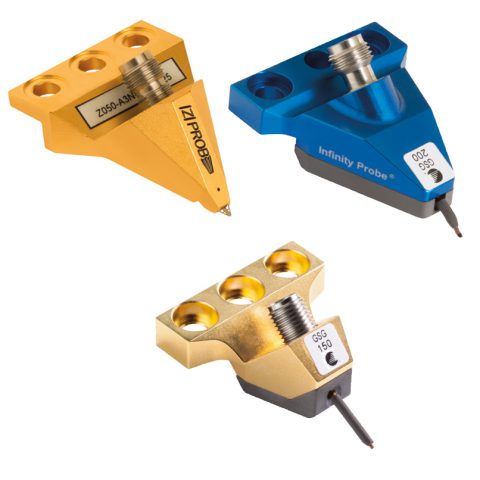Consistency of RF data strongly depends on the contact repeatability, reliability and stability for both calibration and measurements. Unreliable and inconsistent contact leads to re-contacting and re-measurement of the device under test (DUT), repeated calibration and significant increases in test time. Moreover, unnecessary touchdowns on the calibration standards and DUT pads decrease the lifetime of the calibration substrate, destroy DUT pads and make further probing and/or bounding difficult or impossible.
Current technologies for semiconductor development utilize different contact pad metallization materials. RF probes must provide reliable and consistent contact on all types of contact pad material—from soft and very low-resistant gold, to aluminum, which builds a highly-resistive, hard-to-break-through oxide layer under atmospheric conditions creating challenges of its own. Particles from the contact pads can be accumulated on the RF probe tips, significantly reducing the accuracy and consistency of data. Depending on the contact pad material, probe design and operator experience, cleaning of the RF probe can be required after a few contact cycles.
RF characterization of an active device in a hot mode requires S-parameter measurement at different DC bias points. Applying DC sweep adds a new dimension to the device data, exponentially increasing the measurement time. Depending on the number of bias points and the frequency list, RF probes may need to stay in contact for 30 minutes or longer when characterizing just one transistor. Therefore, contact quality and contact stability over time are essential for accuracy and consistency of such measurements. Parasitic vibrations that may be generated by laboratory equipment or outside sources and transmitted to the measurement platform over the laboratory floor and table can turn long-term measurements into a very challenging exercise.
A RF probe station with a solid system frame with a granite base and integrated vibration isolation solution can decouple the DUT from possible vibrations. However, RF probes with the ability to make a low resistance contact over long periods of time even with micro vibrations is essential to accurate DUT measurement – and this needs to be true even for the toughest to probe pad materials like aluminum. Our SUMMIT Probe Systems incorporates many easy-to-use features that help ensure repeatable contact performance, along with Infinity Probes that provide best-in-class contact resistance that leads to accurate calibration and DUT measurements.
